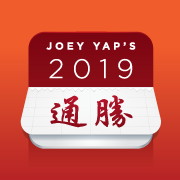
For those who are into feng shui, Joey Yap may be a household name. The founder and master trainer of Mastery Academy of Chinese Metaphysics, a global
organisation devoted to the teaching of feng shui and other Chinese metaphysics subjects, has come up with this book to “help people understand feng shui
better and also let them know that what is generally known as feng shui today is not quite the same as what past revered masters would regard as classical feng shui.”
In this 32-chapter compilation of short, easy-to-read essays and stories, Yap aims to “correct and debunk certain ideas about feng shui that have built up over the years” and explain away some of the superstitions and taboos. He states from the outset that feng shui is not about quick fixes, and hopes to change the “low” perception some have of this ancient science.
What is of great help to readers and young feng shui enthusiasts is that there is at least one illustration on almost every page to help clarify his explanations. Each of the colourful visuals, which include graphics, tables, photos and symbols, presents a lucid account of the message being put across, aside from brightening up the book.
In the few chapters, Yap gives a brief history of feng shui, what it is and what it is not. We get to know about yin qi and yang qi, and that the influence og qi “which in any given environment is governed by certain patterns calculable by formulae, can be assessed in reference to time and location.” We also learn about the purpose of “authentic classical feng shui systems” and that “a practitioner uses feng shui to remedy existing problems (corrective ), enhance wealth, health or relationships or to produce a particular outcome ( constructive ) or to predict future possibilities ( predictive ).”
We are then introduced to the application of feng shui methods, including the “ Life Gua” which has our year of birth, and thus the animal sign, as reference point, and the paramount importance of not underestimating the power of location.
Next, Yap addresses issues like enthusiasts who blindly follow instructions, date selection frenzy, unfounded fears of the repercussions of missing the “auspicious hour” and the “underwater taboo”. Other topics incluce matters of bedroom ecstacy, the wealth sector, the love corner, the office “cubicle thing”, and “arousing the dragon”
My favourite chapters are on understanding your destiny, changing your life, how the animal signs are “only used as a reference to the 12 earthly branches”, finding the noble man, the significance of water and mountains, and ascertaining whether “dragons are really luckier than other animal signs”. It was enlightening to find out what “ the best kept feng shui secret” is.
The last chapter, From Joey Yap’s Mailbag, is perhaps, the most interesting. Here, the author addresses questions he has received over the years via e-mail from around the world. Among them are questions on feng shui love rituals, office qi, wang (wealth) qi, the wind chime, Ba Gua mirror, and toilet humour. For example, a woman wanted to know if it was true that “wood wife plus metal husband equals doom”.





 For those who are into feng shui, Joey Yap may be a household name. The founder and master trainer of Mastery Academy of Chinese Metaphysics, a global
organisation devoted to the teaching of feng shui and other Chinese metaphysics subjects, has come up with this book to “help people understand feng shui
better and also let them know that what is generally known as feng shui today is not quite the same as what past revered masters would regard as classical feng shui.”
For those who are into feng shui, Joey Yap may be a household name. The founder and master trainer of Mastery Academy of Chinese Metaphysics, a global
organisation devoted to the teaching of feng shui and other Chinese metaphysics subjects, has come up with this book to “help people understand feng shui
better and also let them know that what is generally known as feng shui today is not quite the same as what past revered masters would regard as classical feng shui.”


